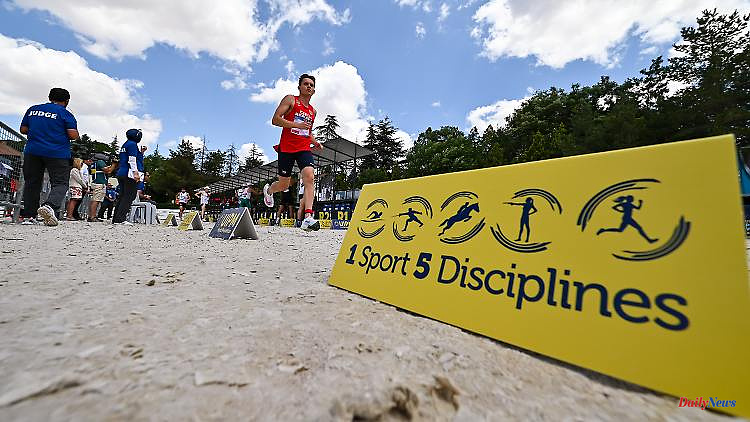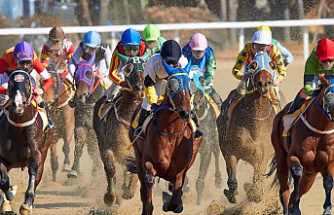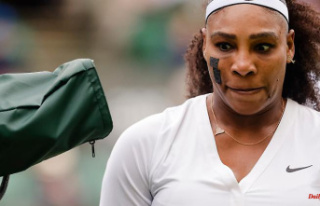Tokyo was a turning point for the modern pentathlon. Now the sport wants to live up to its name and abolishes horseback riding. The substitute discipline is being put to the test for the first time in Ankara. The president of the German association considers the upheaval to be overdue. It's about the future.
Marvin Dogue prefers not to deal with the topic at all. "I already have five sports that I do professionally, and we'll see what comes after that," said the man from Potsdam after winning the title at the international German Championships in modern pentathlon in Berlin. But the 26-year-old cannot close his eyes to the imminent upheaval: At the 2024 Olympic Games in Paris, the modern pentathlon will take place for the last time with show jumping.
With great fanfare, the world association UIPM tested the substitute discipline in Ankara for the first time on Monday and Tuesday - an obstacle course similar to the "Ninja Warrior" from the RTL show of the same name. Nine obstacles had to be overcome over a distance of 100 meters. This included swinging on a rope, climbing a 2.5 meter high ladder with ascent and descent, balancing on a beam and finally climbing a curved wall, the so-called tsunami wall.
"That's a really good thing," said Robin Schmidt, spokesman for the German Modern Pentathlon Federation (DVMF). The five-strong German delegation among the 19 participating nations performed successfully in Ankara. Tobias Hierl won the men's competition, Schmidt took third place, as did Annika Schneider in the junior women's category.
The course has a "challenging character that was fun. There's always something happening," reported Schmidt. You have to weigh risk against safety, the sport also appeals to other areas of strength. He advocated that the obstacle competition, like riding now, be placed at the beginning of the pentathlon. "It's a good start to the competition."
With the new format, the world association wants to maintain its Olympic status and be part of the program again in Los Angeles in 2028 - as of now, the sport is not included. For Michael Dörr, the upheaval is overdue. "It's called modern pentathlon, so we can also modernize - and we have to," said the president of the German association. He is a self-confessed riding fan - but campaigns for the abolition of the controversial discipline. "We draw a horse and have to see how we get along. In this respect we degrade a living being to a piece of sports equipment. The regulations don't allow it any differently," he complained.
For the former women's national coach, riding is "a relic from the past", from around 1900 or 1910, "when everyone still had a horse, when the horse was the main means of transport". And further: "This is a braid that no longer fits into today's world. Complex, expensive, only a few nations can afford it."
With the cancellation of riding, the world association is reacting to the incidents at the Olympic Games in Tokyo last year and the specifications of the International Olympic Committee (IOC). In Japan, the German Annika Schleu caused a stir and sharp criticism. The then leader in the intermediate classification had not been able to cope with a horse that had been drawn to her and was completely insecure; she had used crop and spurs desperately. "That was the catalyst. It's just the stupid situation that it was such a brutal cut," said Dörr. The change, the ex-pentathlete is convinced, would have happened that way.
The IOC requirement is that the fifth competition, in addition to fencing, swimming and the laser run of pistol shooting and running, must be accessible worldwide, popular among all age groups, dynamic and attractive to spectators worldwide, as well as being inexpensive and easy to understand.
The obstacle course is exactly the right way for Dörr. "It will definitely be a fairer sport. Because now the athlete has everything in his own hands. He decides whether he makes a mistake or not. The sport will not only be fairer, but also more global. Of course, the established ones will now have more competition " he judged. His favorite criterion for the obstacles: "Spectacular. The spectators have to like it."
Dogue, who considers himself a good rider and recently finished second in the Team Mixed World Cup together with Janine Kohlmann from Potsdam in Ankara, is currently preparing for the World Championships in Alexandria, Egypt, at the end of July and in perspective for the Olympics in Paris. "At the moment I'm not very concerned with it because I'm focusing on the 2024 Olympic Games, which are about riding. What comes after that comes after that," said the man from Potsdam. But he already felt the harbingers of change in Berlin: the championships took place without show jumping.












